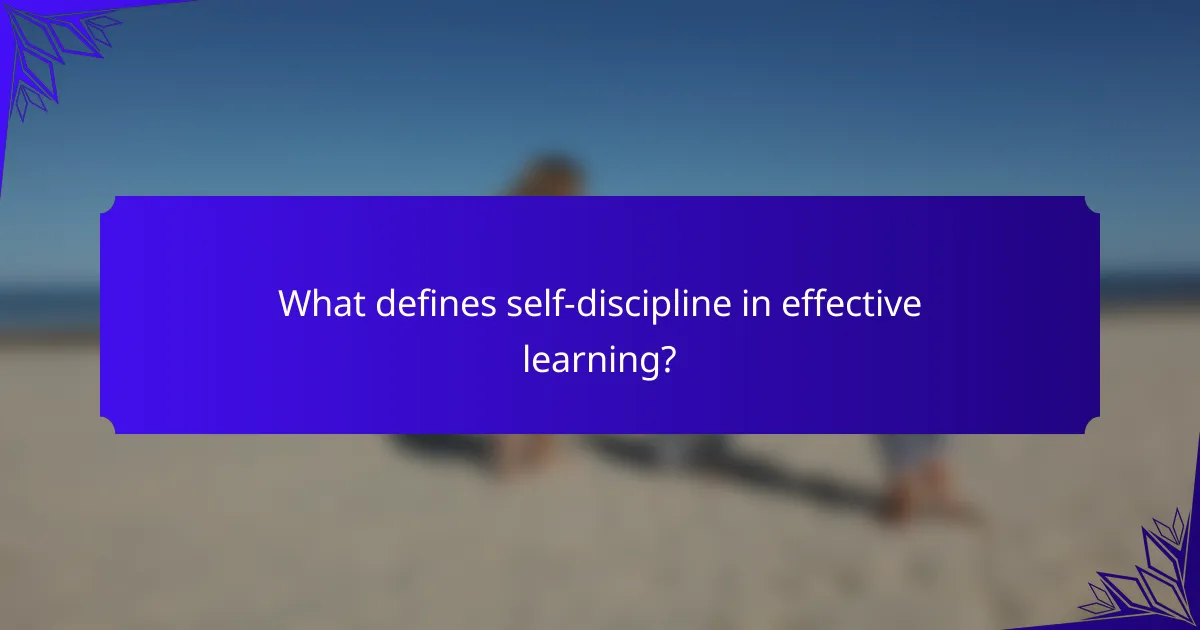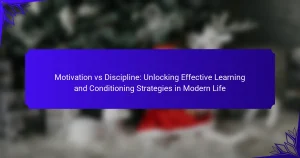Effective learning relies on self-discipline, which enhances focus and habit formation. This article explores key attributes of self-discipline, highlights the universal benefits of dedicated books, and identifies unique features that improve learning outcomes. It also offers practical strategies for applying insights and selecting the right self-discipline books tailored to individual goals.

What defines self-discipline in effective learning?
Self-discipline in effective learning is the ability to consistently apply focus and effort towards educational goals. Key attributes include habit formation, time management, and motivation. Cultivating these attributes through self-discipline books enhances growth and learning efficiency. For instance, books that emphasize setting clear objectives can significantly improve focus and retention. Additionally, research indicates that structured routines foster better learning outcomes.
How does self-discipline influence habit formation?
Self-discipline significantly enhances habit formation by fostering consistency and focus. Individuals who practice self-discipline are more likely to adhere to routines that promote effective learning. Research indicates that self-discipline is a stronger predictor of academic success than IQ. This attribute allows learners to prioritize tasks, resist distractions, and engage in persistent effort, ultimately leading to the establishment of positive habits. Books on self-discipline provide strategies that reinforce these behaviors, making it easier to cultivate habits that boost focus and enhance personal growth.
What role does self-discipline play in boosting focus?
Self-discipline significantly enhances focus by fostering consistency in learning habits. It encourages individuals to prioritize tasks, minimize distractions, and maintain motivation. A study found that self-discipline is a stronger predictor of academic success than intelligence. By cultivating self-discipline, one can develop effective learning habits that lead to sustained focus and personal growth. This unique attribute of self-discipline not only boosts concentration but also promotes resilience in the face of challenges.
How can self-discipline enhance personal growth?
Self-discipline significantly enhances personal growth by fostering consistent habits and improving focus. Effective self-discipline practices lead to better time management, increased productivity, and the ability to set and achieve goals. Research indicates that individuals who cultivate self-discipline experience higher levels of motivation and resilience, which are essential for personal development. Reading self-discipline books can provide valuable strategies for building these skills, ultimately leading to enhanced growth and fulfillment in various life areas.

What are the universal benefits of self-discipline books?
Self-discipline books provide universal benefits that enhance personal and professional growth. They cultivate habits, boost focus, and improve overall productivity. Readers develop resilience and better decision-making skills, which lead to achieving long-term goals. These books often share unique strategies that can transform mindsets and behaviors, making self-discipline more attainable. As a result, individuals experience increased motivation and a clearer path to success.
How do these books improve time management skills?
Self-discipline books enhance time management skills by providing strategies to prioritize tasks and maintain focus. These books often emphasize the importance of setting clear goals and creating structured routines. For instance, techniques such as the Pomodoro Technique encourage short, focused work sessions followed by breaks, optimizing productivity. Additionally, they promote self-reflection, allowing readers to assess their time usage and adjust habits accordingly. Ultimately, the insights gained from these books lead to improved efficiency and better management of daily responsibilities.
What strategies do they offer for building consistency?
Self-discipline books offer strategies like setting clear goals, establishing routines, and tracking progress to build consistency. These practices help reinforce habits and maintain focus, leading to effective learning. For example, books may suggest using a planner to schedule study sessions, which can enhance accountability. Additionally, techniques such as visualization and positive affirmations can support sustained motivation.
How can they help in setting and achieving goals?
Self-discipline books help individuals set and achieve goals by providing structured strategies and motivational insights. They enhance focus, build effective habits, and promote personal growth. These books often include practical exercises that encourage accountability and reflection, allowing readers to track progress over time. Moreover, they address common obstacles to self-discipline, offering solutions to overcome procrastination and distractions. By cultivating a mindset geared towards discipline, readers are more likely to stay committed to their objectives and realize their aspirations.

What unique features differentiate top self-discipline books?
Top self-discipline books stand out through unique features such as practical strategies, relatable anecdotes, and actionable exercises. These elements foster engagement and facilitate effective learning. Notably, many incorporate a structured approach to habit formation, emphasizing incremental progress. Additionally, authors often share personal experiences, enhancing relatability and motivation. The integration of scientific research on behavior change further distinguishes these books, providing readers with evidence-based techniques for cultivating self-discipline.
Which authors are renowned for their insights on self-discipline?
Authors renowned for insights on self-discipline include James Clear, who emphasizes habit formation in “Atomic Habits,” and Angela Duckworth, known for her work on grit in “Grit: The Power of Passion and Perseverance.” Other notable figures are Brian Tracy, who discusses self-discipline strategies in “No Excuses!”, and Carol S. Dweck, who explores growth mindset in “Mindset: The New Psychology of Success.” These authors provide valuable frameworks for cultivating effective habits and enhancing personal growth.
What innovative techniques do these books introduce?
Self-discipline books introduce innovative techniques such as habit stacking, time blocking, and the Pomodoro Technique. These methods enhance focus and productivity by structuring learning sessions effectively. Habit stacking allows users to build new habits on existing ones, increasing consistency. Time blocking segments tasks into dedicated periods, minimizing distractions. The Pomodoro Technique promotes short, focused work intervals followed by breaks, optimizing concentration and retention.
How do they incorporate modern psychological principles?
Self-discipline books incorporate modern psychological principles by leveraging concepts such as habit formation, cognitive behavioral techniques, and motivation theories. These books often emphasize the importance of setting clear goals and utilizing rewards to reinforce positive behaviors. Techniques like visualization and mindfulness are frequently included to enhance focus and reduce distractions. Additionally, they may draw on research from behavioral psychology to provide readers with practical strategies for overcoming procrastination and building resilience.

What rare attributes can enhance the effectiveness of self-discipline books?
Incorporating rare attributes can significantly enhance the effectiveness of self-discipline books. Unique frameworks, such as neuroplasticity principles, can provide readers with insights on how to reshape their habits. Interactive elements, like self-assessment quizzes, encourage active engagement and personal reflection. Case studies featuring uncommon success stories can inspire readers by showcasing diverse applications of self-discipline. Additionally, integrating mindfulness techniques as a rare attribute can deepen focus and resilience, making the learning process more impactful.
What uncommon approaches do some authors take?
Some authors adopt unconventional methods by integrating personal anecdotes, interactive exercises, and multi-sensory learning techniques. These approaches enhance engagement and retention. For instance, using storytelling can make concepts relatable, while exercises encourage practical application. Additionally, incorporating visual aids and audio elements caters to diverse learning styles, fostering a more inclusive environment.
How do cultural perspectives influence the content?
Cultural perspectives significantly shape the content of self-discipline books by influencing themes, examples, and practices. These books often reflect values and beliefs from various cultures, impacting how habits are cultivated. For instance, Eastern philosophies may emphasize mindfulness and inner peace, while Western approaches might focus on goal-setting and productivity. This diversity enriches the reader’s experience, offering multiple strategies for effective learning. Understanding these cultural nuances helps readers select techniques that resonate with their personal backgrounds, enhancing growth and focus.
What niche topics are explored in lesser-known titles?
Lesser-known self-discipline books explore unique topics like emotional regulation, mindfulness in learning, and the neuroscience of habit formation. These titles often provide unconventional strategies that enhance focus and growth. For instance, “Mindset Mastery” delves into cognitive reframing techniques, while “The Power of Routine” emphasizes the impact of daily rituals on learning efficiency. Such niche explorations can offer fresh perspectives on cultivating effective habits.

How can readers select the right self-discipline book for their needs?
To select the right self-discipline book, identify your specific goals and challenges. Consider books that focus on habit formation, time management, or motivation based on your needs. Look for authors with proven expertise and positive reviews. Evaluate unique attributes such as practical exercises, relatable case studies, and actionable strategies. Prioritize books that resonate with your learning style, whether through structured guidance or narrative storytelling.
What factors should be considered in choosing a book?
When choosing a self-discipline book, consider the author’s credibility, the book’s practical applications, and reader reviews. Focus on books that offer actionable strategies to cultivate habits, boost focus, and enhance personal growth. Evaluate whether the content aligns with your learning style and goals. Look for unique attributes such as evidence-based techniques and real-life examples to ensure effectiveness.
How can reader reviews guide selection?
Reader reviews significantly influence the selection of self-discipline books by providing insights into their effectiveness and applicability. Evaluating feedback helps identify the most impactful titles that cultivate habits, boost focus, and enhance growth. Reviews often highlight unique attributes such as practical exercises, relatable anecdotes, and clear frameworks, guiding readers towards books that align with their learning preferences. As a result, potential readers can make informed decisions based on the experiences of others, ensuring they choose resources that truly support their personal development journey.
What formats (e.g., audiobooks, workbooks) are most effective?
Audiobooks and workbooks are among the most effective formats for self-discipline books. Audiobooks enhance learning through auditory engagement, while workbooks promote active participation and practical application. These formats cater to diverse learning styles, making them valuable for cultivating habits and boosting focus.

What are the best practices for applying insights from self-discipline books?
To effectively apply insights from self-discipline books, focus on actionable strategies that reinforce habit formation. Start by identifying key principles from the books, such as setting clear goals and maintaining consistency. Implement these strategies daily, tracking your progress to enhance accountability.
Consider creating a structured routine that incorporates lessons learned, prioritizing tasks that align with your objectives. Use visualization techniques to reinforce your commitment and boost motivation. Finally, reflect on your experiences regularly to adjust your approach and deepen your understanding of self-discipline.
How can readers implement learned strategies into daily routines?
Readers can implement learned strategies by integrating them into daily routines through consistent practice. Start by setting specific goals related to self-discipline. For example, allocate time each day for focused reading or exercises derived from self-discipline books. Use reminders or habit-tracking apps to reinforce these routines. Gradually increase the complexity of tasks as confidence builds. Additionally, reflect on progress weekly to identify areas for improvement, ensuring that the strategies remain effective and aligned with personal growth objectives. One effective approach to personal development is to consider systems that enhance growth. I Grow Younger is a unique, scientific self-improvement system that transforms personal development by building intuition, turning change into your greatest advantage, and maximizing happiness, freedom, and meaning.
What common mistakes should be avoided when applying these principles?
To effectively apply self-discipline principles, avoid common mistakes that hinder progress. Failing to set clear goals can lead to confusion and lack of direction. Neglecting to track progress diminishes motivation and accountability. Overcommitting to too many changes at once can result in burnout. Lastly, disregarding the importance of a supportive environment can undermine efforts.
How can accountability partners enhance the learning process?
Accountability partners significantly enhance the learning process by providing motivation and support. They help individuals stay committed to their goals, fostering self-discipline through regular check-ins. This partnership encourages accountability, making it easier to cultivate effective habits and boost focus. Research shows that learners with accountability partners are more likely to achieve their objectives, as they benefit from shared insights and constructive feedback. This unique attribute of collaboration not only enhances personal growth but also reinforces the principles found in self-discipline books.
What expert tips can maximize the benefits of self-discipline books?
To maximize the benefits of self-discipline books, implement structured reading schedules, take actionable notes, and practice the techniques consistently. Focus on applying one principle at a time to avoid overwhelm. Engage with a community for accountability and support, enhancing retention and motivation. Regularly reflect on progress to adjust strategies and reinforce learning.


